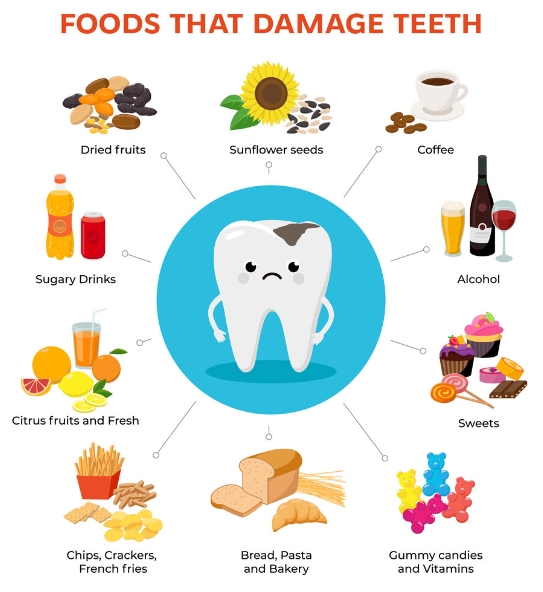
When it comes to maintaining good oral health, proper nutrition plays a vital role. The foods and beverages we consume can either contribute to healthy teeth and gums or increase the risk of dental problems. Understanding the impact of nutrition on oral health can help you make informed choices for a healthier smile.
Here are some key points to consider:
Essential Nutrients for Oral Health: A balanced diet that includes essential nutrients is crucial for maintaining optimal oral health. Calcium, vitamin D, phosphorus, and vitamin C are particularly important. Calcium and phosphorus contribute to the development and maintenance of strong teeth and bones. Vitamin D aids in calcium absorption, while vitamin C supports healthy gums.
Foods That Promote Oral Health: Incorporating certain foods into your diet can benefit your oral health. Some examples include:
Dairy Products: Milk, cheese, and yogurt are excellent sources of calcium and phosphorus, which help strengthen tooth enamel.
Crunchy Fruits and Vegetables: Apples, carrots, celery, and other crunchy produce stimulate saliva production, which helps wash away food particles and neutralize acids in the mouth.
Leafy Greens: Spinach, kale, and other leafy greens are rich in vitamins and minerals, including calcium and vitamin C, which support healthy gums and teeth.
Nuts and Seeds: Almonds, walnuts, and sesame seeds contain beneficial nutrients such as calcium, vitamin D, and phosphorus that contribute to oral health.
Water: Staying hydrated is crucial for maintaining a healthy mouth. Water helps rinse away bacteria and food particles and keeps saliva production optimal, which is essential for neutralizing acids and protecting teeth.
Foods and Habits to Limit or Avoid: Some foods and habits can have a negative impact on oral health. Limit or avoid the following:
Sugary Foods and Drinks: Consuming excessive amounts of sugary foods and beverages can contribute to tooth decay. Bacteria in the mouth feed on sugar, producing acids that erode tooth enamel.
Acidic Foods and Drinks: Citrus fruits, carbonated drinks, and other acidic foods can weaken tooth enamel over time. Limit their consumption and rinse your mouth with water afterward.
Sticky and Chewy Foods: Sticky candies, dried fruits, and chewy snacks can get stuck in the crevices of your teeth, increasing the risk of cavities. Be mindful of these choices and brush your teeth thoroughly afterward.
Smoking and Tobacco Use: Tobacco use in any form is harmful to oral health. It increases the risk of gum disease, oral cancer, tooth discoloration, and bad breath. Quitting smoking or avoiding tobacco is crucial for maintaining a healthy mouth.
Oral Hygiene Practices: While nutrition plays a significant role in oral health, it is essential to combine it with good oral hygiene practices. Brush your teeth at least twice a day with fluoride toothpaste, floss daily, and visit your dentist regularly for check-ups and professional cleanings.
By understanding the relationship between nutrition and oral health, you can make informed choices that promote a healthy smile. Remember, a balanced diet, along with proper oral hygiene practices, is key to maintaining optimal oral health throughout your life.





